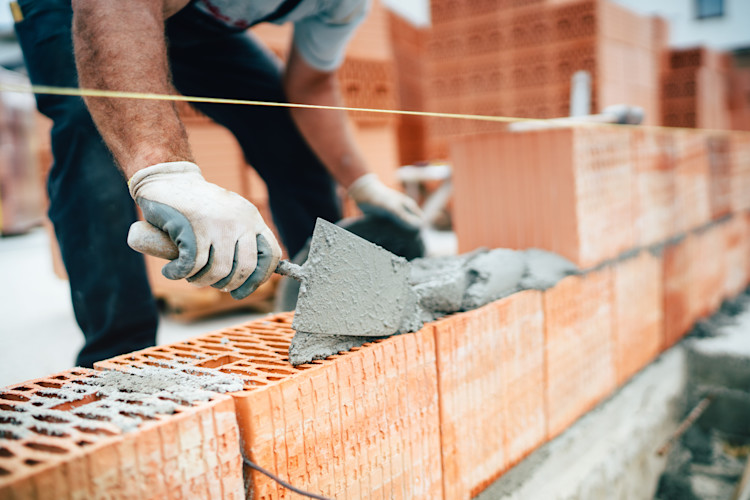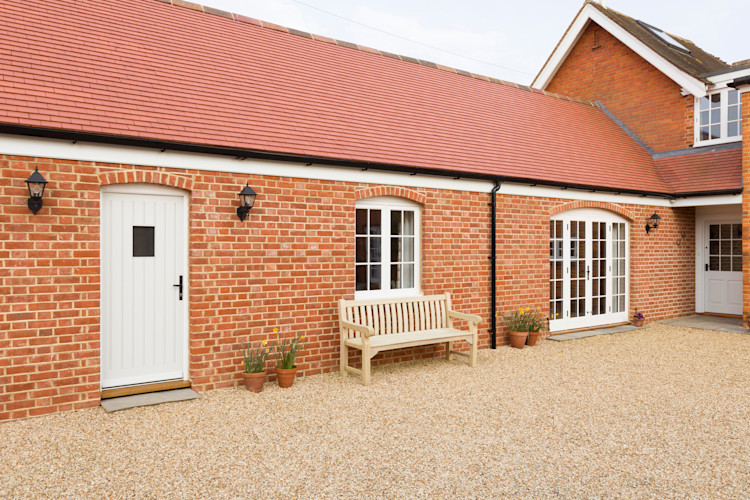Find an Extension Specialist near you
The average rating for Bark Extension Specialists is 4.74, based on 297,960 reviews
How much is a house extension in 2025? Get estimated prices for your project, keep it within budget, and get money-saving tips with our handy extension price guide.
Whether you're getting ready to welcome a new member of the family, you want to boost your property price, or you simply need more room, you may well be thinking: How much does a house extension cost? It's a big question with a lot of answers - and we're here to guide you through them.
To get a truly accurate figure, we recommend requesting quotes from local extension specialists, as they'll take into account all of the small details that make your project unique. To get you started, we're rounded up the average prices paid for extensions in the UK, so you can understand how projects are priced and why builders charge what they do.

A property extension involves extending the current boundaries of your home - quite literally adding more space and making it a part of the existing property. Extension come in various shapes and sizes depending on your budget and the amount of extra space you are looking to add. For example, you can add a simple single-storey extension at the back of your home. This would only involve removing a partial wall or demolishing an existing wooden extension in favour of brick.
House extensions can also be far more extensive, especially if you're building to the side of your home, as it would require the external walls to be demolished and rebuilt. The most expensive property extensions span multiple storeys. While they're more expensive, these are likely to add the most value to your home, especially if extra bedrooms or bathrooms are created.
Since an extension often involves significant building work, planning permission is often needed. The good news: in the last quarter of a recent calendar year (October to December) 89% of planning permission applications for 'householder development' were granted (that's for things like extensions, loft conversions, and conservatories). In general, the chances of having permission granted aren't bad.
It’s important to consider just how much your property extension project will cost. Most builders will calculate your house extension cost per metre square (m2). The following numbers are based on the prices of local UK professionals and how much homeowners pay:
| Minimum cost (per square meter) | £1,320 |
| Maximum cost (per square meter) | £2,500 |
The average of these two numbers is £1,910 per square metre.
Let's say you want to built a new 20m² kitchen. This extension would range approximately from £26,400 to £50,000, exclusive of VAT at 20%. You will also pay for anything else you might need in this new space - let's say tiles, new appliances, and interior decoration, not to mention electrical work and plumbing.
Of course, if the same space was to be turned into an office, you likely wouldn't need plumbing or things like expensive splashback tiles, so the purpose of your extension will significantly affect the cost too. Without knowledge of the extension's design, materials, construction methods, and labor, precise costing is challenging. The provided range of £1,320 to £2,500 per square meter serves as a benchmark, reflecting average pricing trends within the industry.
On average, the total amount spent by homeowners is usually between £15,000 and £100,000 depending on whether it’s a single, double or multi-storey extension.

When you build your extension, you won't just pay for having the walls and a roof put in - there's a lot more work that happens before, during, and after the build. Here's a list of other costs to keep in mind:
| Item | Average cost |
| Architect | £800 |
| Basic fittings and finishes | £680 |
| Ground clearance | £300 |
| New windows (double -glazed casement, each) | £600 - £850 |
| New external door | £400 - £1,000 |
| New internal door | £200 - £400 |
The cost of a property extension can vary depending on different factors. These include:
Your current property
The extension size
Single or multi-storey
The age and style of your property could determine which type of extension is more suitable. Although getting expert advice does come at a cost, it will ensure the potential of the property is reached.
As there are so many ways you can go about extending your home, you need to decide what is most important. For example, is it simply a case of wanting a bigger kitchen, or would the upstairs also benefit from an extension too?
Remember that any extension work you do will make your garden area smaller, which could affect your property price. You’ll also need to consider any access issues too, especially if you are building out to the side of the property. It’s possible to build a double-storey extension that is hollowed out at the bottom so that you don’t lose access.
Property extensions come in all shapes and sizes. Remember that your builder will charge per square meter, so the size will be the biggest determiner of the overall cost. If you have a lot of land at the side or rear of your property, then you have the room for a larger extension. But with the added floor space comes an increased cost.
The most common and cheapest form of a property extension is a single storey one. As the name suggests, it will only be on the ground level of the property. A single-storey extension can be used to add more space to any lower floor room in your house. However, they are usually built to create a larger kitchen or dining space. In bungalows, single-storey extensions can create extra bedrooms.
Double-storey extensions involve both the ground and the first floor. At the top, you can either choose to add a flat roof or extend your current roof space to blend with the look of your property better. Adding a roof will be more expensive, but does give the option for a loft conversion in the future.
Another option is a multi-storey extension. This will give you additional space on the ground floor, first floor, and the top floor of your home. Multi-storey extensions are the most expensive but will add the most value to your home, especially if additional bedrooms or bathrooms have been created in the process.
| Type of extension | Highest average price (in total) | Lowest average price (in total) |
| Single storey | £40,000 | £15,000 |
| Double storey | £60,000 | £38,000 |
| Multi-storey | £100,000 | £47,000 |
Single storey extensions are by far the cheapest option, starting at just £15,000 on average. The prices fluctuate because your builder will be working in the square meters you wish to add, rather than the extension type alone. The spec of the build whether it be basic, standard, or deluxe is also going to impact the price.
Multi-storey extensions are the most expensive, ranging from £47,000 to £100,000 for larger extensions. However, as these will increase the living space on every level of your home this will be reflected in the value of your property.

Estimating how much your house extension will cost is tricky because there are so many moving parts. House extensions cost more or less depending on how standard or unique the design is. You'll also need to pay for materials (which your builder can sort out for you) and potentially a project fee. Another thing to budget for is the cost of labour. Here's how much builders charge for labour, on average, per hour - it's a good way to see how prices are different up and down the country.
| Location | Builder average hourly rate |
| Midlands | £25 |
| London | £43 |
| North East | £24 |
| North West | £26 |
| South West | £28 |
Builders will either work on a day rate, hourly rate, or a fixed fee. As property extensions take several weeks, the labour is a huge part of the cost. On average, builders in the UK charge between £24 and £28 per hour. Building an extension in London is more expensive given the higher cost of living, so you could pay up to £43 per hour in London.
Fixtures and fittings - The fixtures and fittings will also determine the costs. Luxury materials such as Velux windows or marble flooring will add more costs to the project. Likewise, your extension will need insulation and external rendering. There’s also the cost of installing electricity and plumbing to consider too.
Planning permission - Planning permission is of course the top consideration for any building work you wish to undertake. This especially the case if you live in a listed building. There will be costs associated with surveyors and architects, especially for more ambitious projects. If you have neighbours that live in close proximity you’ll also need to consider their needs too. If the building work is set to be disruptive, it’s always worth talking it through with your neighbours. You’ll also need to make sure any building work doesn’t encroach on their land or block the light from their property. The government website has a great guide to when you do (and don't) need planning permission.

If you love your home or the area you live in, but lack the space you need, then getting an extension is absolutely something to consider. Extending your property can breathe new life into it, creating a warm and inviting space to raise your family in, without the hassle of buying and selling.
As an example, many period properties have a small kitchen that’s not fit for dining or entertaining. A single-storey extension would greatly increase the amount of space you have for cooking in. Likewise, if you have a small ‘box room’ bedroom, a double-storey extension would turn this into a double room. Plus, it would add more living space downstairs too. If your extension is carried out to a high standard, it will most certainly add significant value to your home.
There is, of course, another benefit of extending your house - your property price. While an extension may reduce your garden space, this is usually more than made up for by the value an extension can add.
According to Nationwide, some home extensions can add up to 25% extra value to your property, while a bedroom can add a good 15%. Every new bathroom adds an additional 6% on average. The Office for National Statistics also has a tool to help you calculate the added value of an extension based on your location.
While building an extension is a popular choice for good reason, it's important to be realistic about the downsides too. Most people find that the benefits pay for themselves, but you might want to consider:
Building an extension can be noisy and disruptive to your daily routine, and you might even want to stay somewhere else until it's finished.
The cost - although your house value will probably rise, it's a big initial outlay.
Organising an extension project can be stressful, especially when it comes to filling out paperwork and getting planning permission sorted. This is why a home extension specialist is handy, as they do this all the time and can probably give you advice.
If you're not ready for the cost or hassle of a traditional extension, or you don't have the space, there are some alternatives that might be worth paying for.
Self-contained garden rooms have become increasingly popular since 2020 due to the rise in remote work. They offer a cost-effective alternative for expanding living space, serving as offices, playrooms, gyms, studios, or occasional accommodations.
Portable options like shepherd's huts are popular as they are constructed off-site and delivered finished. They are also easy to relocate without usually requiring planning permission.
Basement extensions can be considered if loft conversions are not possible, especially if there's an existing basement space. However, structural work like underpinning or lowering the floor may be necessary, which can be costly.
A conservatory is another way of extending your home without so much building work. While they still cost money, they can usually be erected faster and they can still add value to your home.
Moving house might be a more practical choice if extending your current home isn't feasible or cost-effective, particularly if you anticipate relocating within the next three to five years.

Still not sure about the cost of a house extension? Here are some more of the answers you'll need.
It takes between six and twenty weeks to complete a property extension; labour makes up a large portion of the costs. You may also require various planning certificates or assessments before the work can even begin, which could be as much as £800 each.
Yes, typically you do pay VAT (Value Added Tax) on building an extension. The current standard rate of VAT in the UK is 20%, which is applied to most goods and services, including construction work. However, there are certain circumstances where you may qualify for a reduced rate of 5% VAT, such as if you're converting a non-residential property into a residential one, or if you're making certain energy-saving alterations. It's advisable to consult with a professional, such as a builder or tax adviser, to understand the VAT implications specific to your extension project.
If your extension falls under permitted development rights and doesn't require planning permission, you don't necessarily have to tell your neighbors before you start building. However, it's sensible to discuss your plans anyway, especially if the extension may affect their property. If planning permission is required, neighbors will be notified as part of the application process.
The average rating for Bark Extension Specialists is 4.74, based on 297,960 reviews